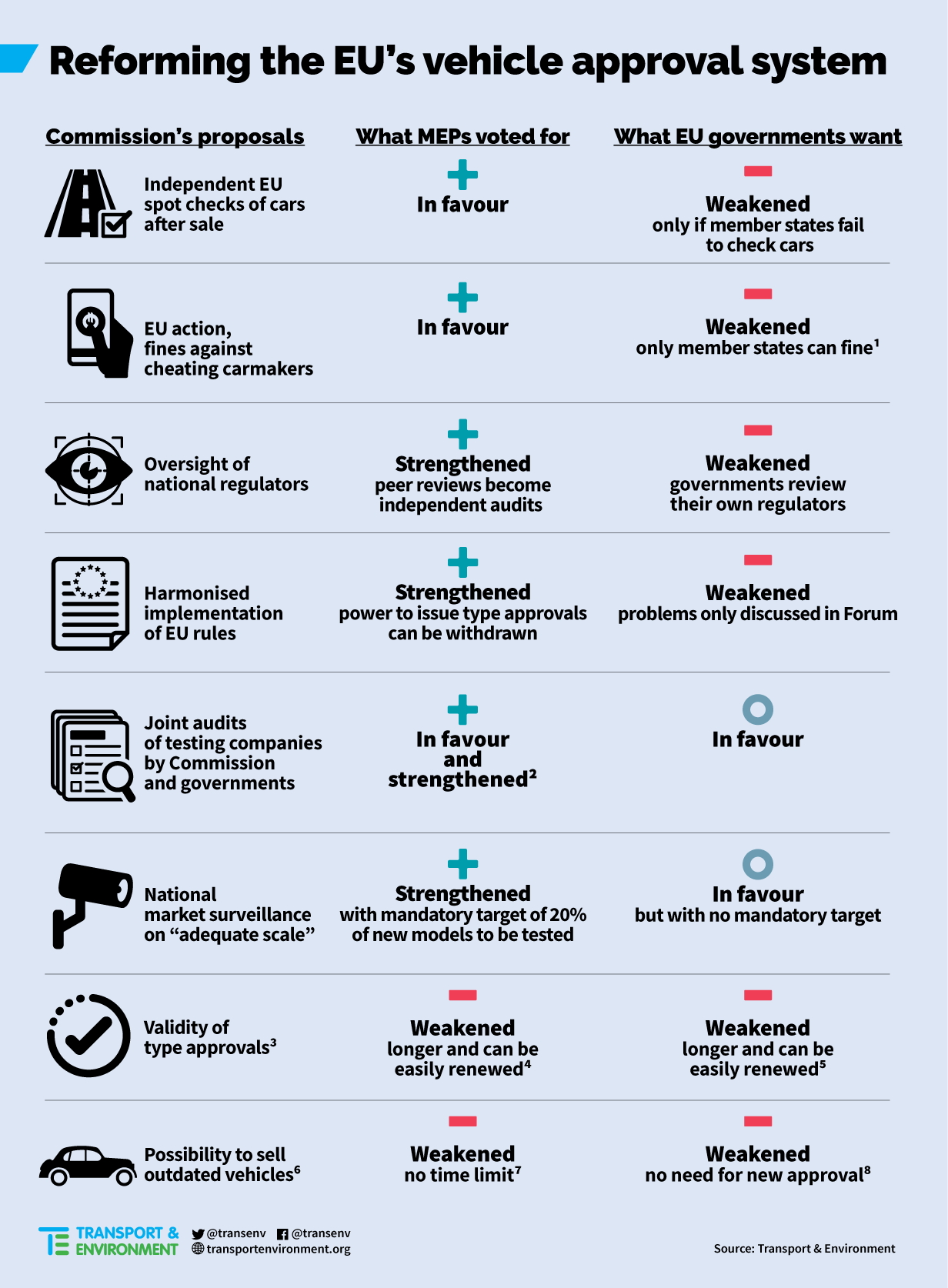
Interested in this kind of news?
Receive them directly in your inbox. Delivered once a week.
WHAT WILL THE DEBATE FOCUS ON?
Malta’s progress report will be followed by a discussion of the key reforms on the table, namely:
· EU-level tests on cars already in use carried out by the Commission. These new independent tests are the main reform proposed by the Commission and are supported by some countries, including France, the UK, the Netherlands and Denmark. Many others, especially Italy, Germany, Spain, Poland, Czech Republic and Slovakia are opposed, fearing an independent body that could over-rule national regulators and require carmakers to recall vehicles or even issue compliance. The current refusal by the Italian ministry to take action against Fiat despite evidence of emissions wrong-doing – exemplified by our cartoon above – is at the heart of the failures of the current EU type approval system.
· EU oversight of national regulators. The Commission has proposed a system of peer reviews for national authorities to review each other. While such a peer-review system would potentially be open to deal-making, many governments are even opposed to this. MEPs earlier this month strengthened the proposals by turning peer reviews into independent audits carried out by external experts and coordinated by the Commission. A national authority could be stripped of its powers to issue type approvals if serious irregularities are found.
WHAT DO GOVERNMENTS WANT?
Transport & Environment has put together this table to highlight the differences between the Parliament and Council positions. For governments’ individual positions, see unpublished report obtained by BEUC here.
FOOTNOTES:
- No member state has to date fined any car manufacturer for manipulating emissions in Europe
- Carmakers’ own testing services have to be audited and must comply with the same rules as other private companies
- Commission proposed to limit all type approvals issued to vehicles to five years in order to avoid current practice by carmakers of endlessly renewing old approvals to avoid having to undergo tests
- MEPs voted to prolong the validity to seven years for cars and 10 for trucks; only documentary checks are required to renew the approvals
- Similar weakening as in the Parliament – but eight years for passenger cars
- The Commission has proposed to streamline the existing end-of-series provisions whereby carmakers are allowed to continue selling vehicles that no longer comply with new rules for a short time to get rid of the stock. The provisions would be allowed for 12 months in all member states upon approval by the original type approval authority
- MEPs have deleted the 12-month limit, leaving it up to each regulator to decide for how long outdated models can be sold
- Council has deleted the requirement for carmakers to receive approval before selling out-of-date vehicles, making it obligatory for all member states to agree to receive older models.
CONCLUSION and NEXT STEPS:
Many governments are choosing to weaken the new regulation instead of agreeing effective post-Dieselgate reform to ensure car makers meet emission standards on the road. According to the European Environmental Agency, 467,000 Europeans die prematurely each year as a result of air pollution, with diesel fumes being a significant contributor. Earlier this week five EU countries – Germany, France, the UK, Italy and Spain –received final warnings before being taken to court for failure to comply with EU pollution limits.
But three of these – Germany, Italy and Spain – oppose the reforms and choose to protect their car industries from effective regulation at the cost of citizens’ health. Unless the rules of vehicle type approval are tightened, the current stalemate on emissions non-compliance and collusion with the car industry will persist. The current case around Fiat emissions in Europe shows what is going to happen with future enforcement and market surveillance if the system is left in the hands of the national regulators.
The plenary of the European Parliament is expected to vote on the type approval regulation in early April, including on whether or not an independent EU authority on vehicle surveillance should be set up. The next Competitiveness Council, scheduled for 29 May, is expected to approve the governments’ position followed by the final negotiations between the three institutions in the second half of 2017.
For more information, see:
Italian investigators’ treatment of Fiat shows why reform of EU testing system is urgently needed


